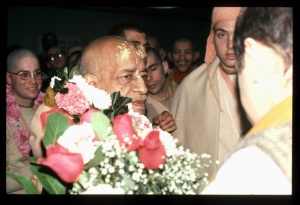SB 4.29.16

A.C. Bhaktivedanta Swami Prabhupada
TEXT 16
- antaḥ-puraṁ ca hṛdayaṁ
- viṣūcir mana ucyate
- tatra mohaṁ prasādaṁ vā
- harṣaṁ prāpnoti tad-guṇaiḥ
SYNONYMS
antaḥ-puram — private residence; ca — and; hṛdayam — the heart; viṣūciḥ — the servant named Viṣūcīna; manaḥ — the mind; ucyate — is said; tatra — there; moham — illusion; prasādam — satisfaction; vā — or; harṣam — jubilation; prāpnoti — obtains; tat — of the mind; guṇaiḥ — by the modes of nature.
TRANSLATION
The word antaḥ-pura refers to the heart. The word viṣūcīna, meaning "going everywhere," indicates the mind. Within the mind the living entity enjoys the effects of the modes of material nature. These effects sometimes cause illusion, sometimes satisfaction and sometimes jubilation.
PURPORT
The mind and intelligence of the living entity in material existence are affected by the modes of material nature, and according to the association of the material modes, the mind is habituated to go here and there. The heart feels satisfaction, jubilation or illusion according to the effects of the modes of material nature. Actually the living entity in his material condition remains inert. It is the modes of material nature that act on the mind and heart. The results are enjoyed or suffered by the living entity. This is clearly stated in Bhagavad-gītā (BG 3.27):
- prakṛteḥ kriyamāṇāni
- guṇaiḥ karmāṇi sarvaśaḥ
- ahaṅkāra-vimūḍhātmā
- kartāham iti manyate
"The bewildered spirit soul, under the influence of the three modes of material nature, thinks himself the doer of activities that are in actuality carried out by nature."